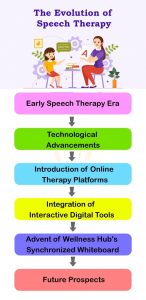The Ideal Age to Begin Online Speech Therapy: Insights for Parents
By Rajini D
Last Updated: December 29, 2023
Imagine this: You’re watching your child play, and as you listen closely, you notice they’re struggling to pronounce certain words or form sentences like other kids their age. It’s easy to wonder, “Is this normal?” or “Should I be concerned?” As a parent, these moments can be filled with uncertainty. But when it comes to speech and language development, knowing when to seek help is key.
One of the most common questions parents ask is: “When is the right time to start speech therapy?” With online speech therapy becoming more accessible, understanding when to begin this journey can make a significant difference in your child’s communication skills. In this article, we’ll explore the ideal age to start online speech therapy, offering guidance that will help you feel confident in supporting your child’s speech development. Let’s dive in!
Understanding Speech and Language Development
As children grow, they reach various speech and language milestones, but it’s important to remember that every child’s journey is unique. While these milestones act as helpful markers, they aren’t rigid guidelines. Some children might start forming sentences early, while others may need more time to express themselves clearly—and that’s perfectly normal.
For example, a child might say their first word around 12 months or combine two words like “more milk” by 2 years old. However, not all children hit these milestones at the same time, and that’s okay. What matters is being aware of their overall progress and recognizing when extra support might be beneficial.
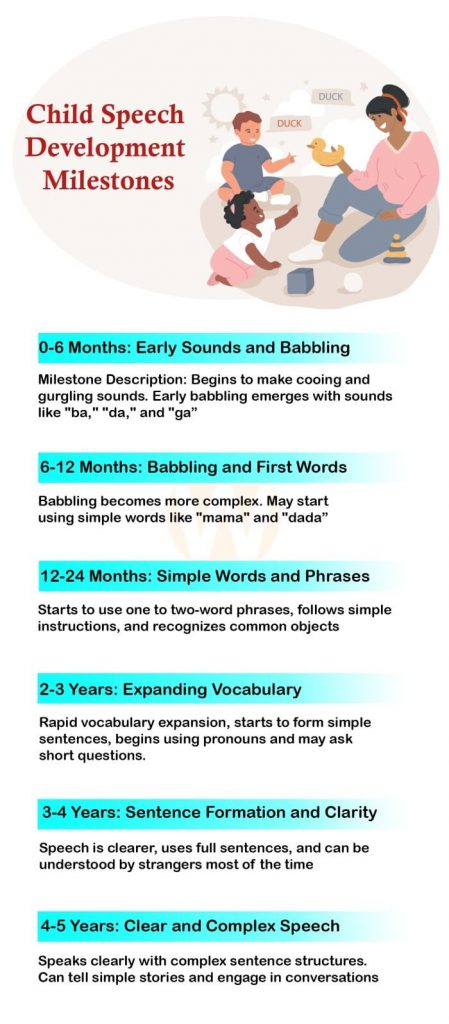
Recognizing the Signs of Speech Delay
While every child develops at their own pace, there are certain signs that may indicate a speech delay and warrant closer attention. Some common indicators include:
- A limited vocabulary for their age. For instance, if a child knows only a few words by 18 months or isn’t using two-word phrases by age 2.
- Difficulty with sounds that are typically easier for children, such as “b,” “d,” or “m.”
- Challenges understanding directions or trouble following simple commands, even though they appear to develop normally in other areas.
For example, if a 2-year-old isn’t combining words like “want toy” or “go outside,” or if a 3-year-old isn’t speaking in short, understandable sentences, these might be signs that speech therapy could be helpful.
Determining the Right Age for Online Speech Therapy
Many parents wonder, “When is the best time to start speech therapy?” The answer can vary because speech and language development is different for every child. However, research shows that early intervention can be especially effective. In many cases, starting speech therapy between 18 months and 2 years is recommended, particularly if there are noticeable signs of a speech delay.
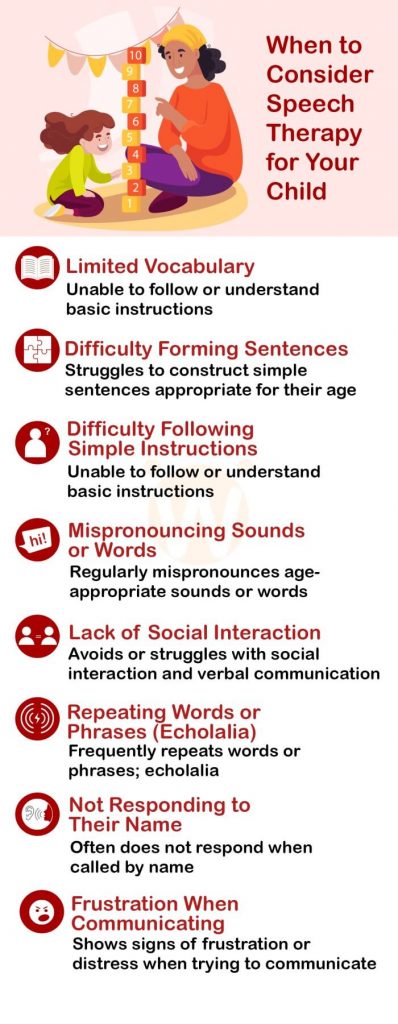
For example, if a toddler isn’t saying simple words like “mama” or “dada” by 12 months or isn’t combining two words by age 2, it might be time to seek professional advice. The goal of early intervention is to help children build strong communication skills during critical periods of brain development.
Benefits of Early Intervention in Speech Therapy
Early speech therapy offers significant advantages. Starting therapy at a young age allows children to tap into their natural learning abilities, making it easier for them to absorb and apply new skills. By addressing speech and language delays early on, children can overcome these challenges before they become more ingrained, helping to streamline their communication development.
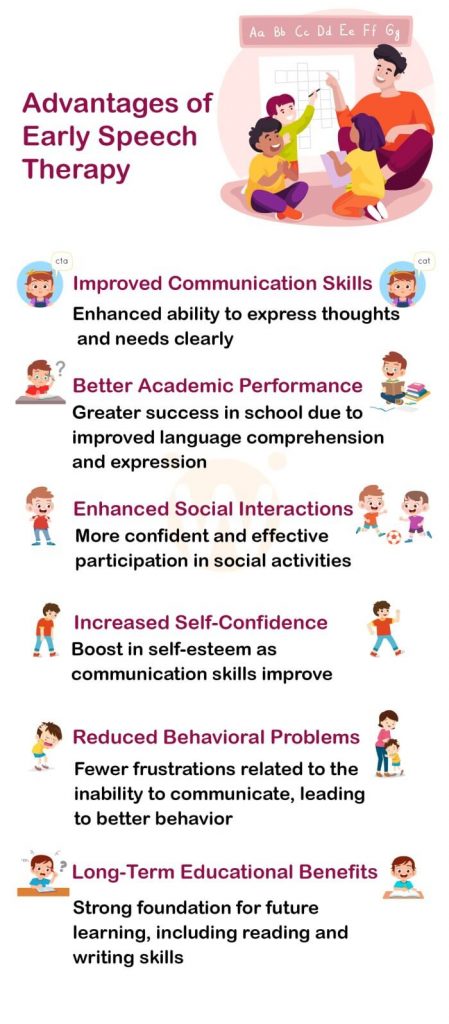
Beyond immediate speech improvements, early intervention sets the stage for long-term success. It builds a strong foundation for future academic achievements and social interactions. Children who receive timely speech therapy are often better prepared to handle the demands of school and social settings. In turn, this proactive approach not only boosts their communication skills but also strengthens their self-esteem and confidence in social situations.
In the case of online speech therapy, platforms like Wellness Hub offer tailored programs designed to meet each child’s specific needs. Every child’s speech journey is unique, and these programs cater to that, providing parents with an effective resource for supporting their child’s speech and language development.
Online Speech Therapy: Customizing for Different Ages
Online speech therapy has revolutionized how we support children’s speech and language development. The success of online therapy comes from its ability to be adapted for different age groups. For younger children, interactive and visually stimulating sessions, including games and colorful images, can keep them engaged and motivated. For example, incorporating animated characters or fun games helps keep a child’s attention while teaching important communication skills.
Comparison of Traditional vs. Online Speech Therapy
| Criteria | Traditional Therapy | Online Therapy |
|---|---|---|
| Flexibility | Set schedule, often during business hours. Less flexibility for parents. | Flexible scheduling. Sessions can be planned around family’s routine. |
| Access to Specialists | Limited to local therapists. Might have longer wait times. | Access to a wide range of specialists regardless of location. |
| Comfort | Sessions in unfamiliar, clinical settings. | Therapy in the comfort of home, potentially reducing child’s anxiety. |
| Engagement Tools | Traditional tools and physical interaction. May vary by clinic. | Innovative digital tools, interactive online resources, and games. |
| Personalization | Can be highly personalized, but may lack innovative tools. | Highly customizable with a wide range of digital resources and techniques. |
| Parental Involvement | Often limited during the session. Parents might receive feedback afterward. | More opportunities for parents to be involved and observe sessions. |
| Cost | Can be higher due to overheads. Travel costs added. | Often more cost-effective; no travel expenses. |
| Effectiveness | Proven effectiveness, particularly for hands-on techniques. | Increasing evidence of effectiveness; suitable for a wide range of needs. |
As children grow older, the therapy can become more structured, focusing on activities that challenge their growing language abilities. For older children, this might include practicing pronunciation, forming more complex sentences, or improving their vocabulary through engaging yet educational exercises.
Online speech therapy is not a one-size-fits-all solution. A tailored approach ensures that therapy responds to each child’s unique learning style. Some children benefit from auditory stimuli, while others might find visual cues more helpful. Platforms like Wellness Hub specialize in customizing these sessions to meet each child’s needs, ensuring the most effective treatment based on their age and learning preferences.
The Role of Parents in Early Online Speech Therapy
Parents play a pivotal role in the success of early online speech therapy. Far from being mere observers, they become active participants in their child’s speech development. In an online setting, parents often help set up the sessions, guide their child’s attention, and continue reinforcing the skills learned during therapy afterward. Their involvement creates a nurturing and supportive environment where children feel encouraged to practice new communication skills.
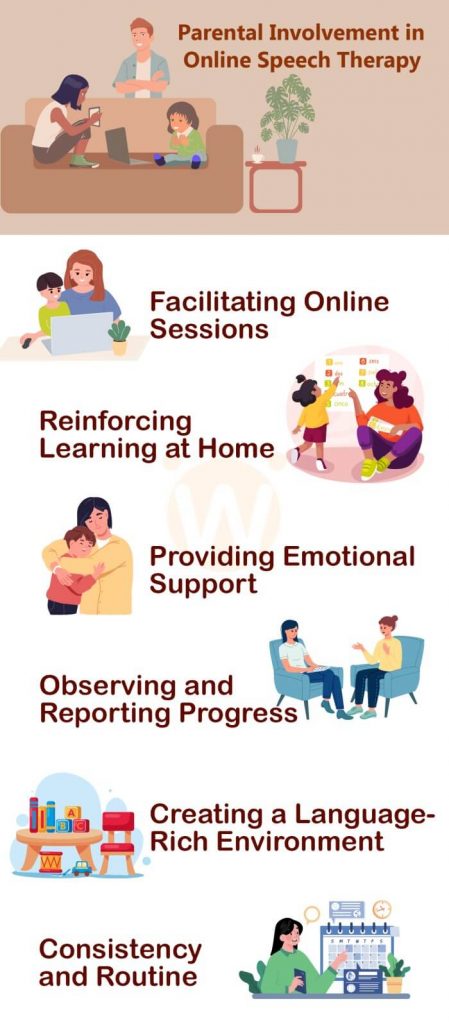
For example, if a child is learning to pronounce new sounds, a parent might sit alongside them during online therapy, helping them practice between sessions by incorporating speech exercises into daily routines. A parent’s positive reinforcement can make all the difference in motivating the child to engage with the therapy.
Case Studies and Success Stories
Online speech therapy has produced numerous success stories, demonstrating its effectiveness. Take the story of a five-year-old boy who struggled with articulation. Initially shy and hesitant, his therapy sessions were customized to include his interests, like animals and superheroes. Within months, his speech improved, and he gained confidence in social interactions.
At Wellness Hub, we’ve seen similar success. One example is a three-year-old girl with expressive language delays. Through interactive online activities and parental support, she expanded her vocabulary and began forming simple sentences, improving her communication with family and peers.
These success stories highlight how personalized online speech therapy can make a lasting impact, helping children overcome communication challenges with tailored, engaging support.
Addressing Challenges in Online Therapy with Young Children
Conducting online speech therapy with young children can present several challenges. Keeping their attention, ensuring they understand the activities, and helping them transfer skills to real-life situations are common concerns. Overcoming these hurdles requires creative and engaging strategies that keep children focused and motivated.
One effective method is using visually appealing materials. Bright images, animations, and videos can help hold a child’s attention during a session. Incorporating movement and physical activities can also be beneficial, especially for young children who might struggle to sit still. Online platforms that include interactive, game-like experiences make learning fun, helping children stay engaged while working on their speech and language skills.
At Wellness Hub, we’ve developed specific techniques to engage young children. For example, we use interactive games and storytelling that are personalized to match each child’s interests. A child who enjoys animals might participate in a session where they practice making animal sounds or naming different animals in a story. For children who respond well to visuals, we incorporate bright, colorful images and animations to explain concepts. For kinesthetic learners, we add physical activities, like mimicking sounds through movement, which helps them stay engaged while working toward their speech goals.
Conclusion
In summary, starting speech therapy early, ideally between 18 months to 2 years, can make a big difference if there are signs of speech delay. Early intervention not only improves communication skills but also boosts confidence and sets your child up for future success.
At Wellness Hub, we specialize in personalized speech therapy, ensuring each child gets the right care for their unique needs. If you have concerns about your child’s speech development, explore our resources and expert guidance at Wellness Hub. Every step you take today helps build a brighter future for your child’s communication journey.
Frequently Asked Questions:
1. What is the ideal age to start online speech therapy for children?
While children develop at different rates, early intervention is key. Online speech therapy can be beneficial starting from as early as 18 months to 2 years, especially if there are signs of speech delay.
2. What are the signs that my child might need speech therapy?
Signs to look for include delayed babbling, limited vocabulary for their age, challenges in forming words or sentences, and difficulty following simple instructions. If you notice these signs, it’s advisable to consult a speech therapist.
3. How can online speech therapy be adapted for different age groups?
Online speech therapy is tailored to suit each age group’s developmental needs. For younger children, therapy may include interactive games and visual stimuli, while older children might engage in more structured activities.
4. What role do parents play in online speech therapy?
Parents are crucial in supporting their child’s speech development, especially in online therapy. They help facilitate sessions, reinforce learning, and provide a supportive environment for practicing new skills.
5. Are there any success stories of children benefiting from online speech therapy?
Yes, many children have shown remarkable improvement through online speech therapy. Success stories range from improved articulation and vocabulary to enhanced confidence in social interactions.
6. What challenges might arise in online speech therapy for young children?
Common challenges include maintaining the child’s attention, ensuring engagement with activities, and applying learned skills in daily life. Tailored strategies and parental involvement are key to overcoming these challenges.
7. How does Wellness Hub customize online speech therapy for children?
Wellness Hub offers personalized online speech therapy sessions, designed to align with each child’s interests, learning style, and developmental needs. Our approach includes interactive activities, parent-guided techniques, and ongoing support.
8. Can speech therapy really make a difference in a child’s development?
Absolutely. Speech therapy can significantly impact a child’s communication skills, social interactions, and academic performance. Early intervention often leads to better outcomes.
9. Is online speech therapy as effective as in-person therapy?
Online speech therapy has been shown to be just as effective as in-person therapy for many children. It offers flexibility, access to specialized therapists, and the comfort of learning in a familiar environment.
10. How can I get started with online speech therapy for my child?
To start, you can visit the Wellness Hub website for more information and to schedule an assessment. Our team will guide you through the process and help you determine the best approach for your child.
About the Author:
Rajini Darugupally
M.Sc., Speech-Language Pathologist (9+ years of experience)
Rajini is a passionate and dedicated Speech-Language Pathologist with over 9+ years of experience, specializing in both developmental speech and language disorders in children and rehabilitation in adults. Driven by a desire to empower each individual to find their voice, Rajini brings a wealth of experience and a warm, genuine approach to therapy. Currently, at Wellness Hub, she thrives in a team environment that values innovation, compassion, and achieving results for their clients.
Book your Free Consultation Today
Parent/Caregiver Info:
Client’s Details:
* Error Message

